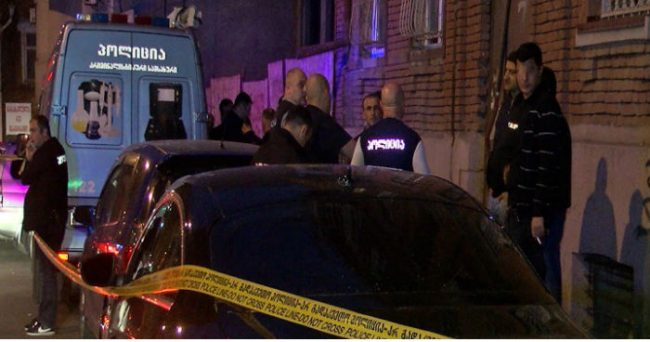
 A man previously convicted of domestic violence but released after receiving a presidential pardon has been arrested for the murder of his stepdaughter on Tbilisi’s Barnovi Street on Friday. According to police, Vepkhia Bakradze cut the throat of his stepdaughter on the street in front of her two children, both below the age of 14.
A man previously convicted of domestic violence but released after receiving a presidential pardon has been arrested for the murder of his stepdaughter on Tbilisi’s Barnovi Street on Friday. According to police, Vepkhia Bakradze cut the throat of his stepdaughter on the street in front of her two children, both below the age of 14.
Twenty-four-year-old Tako Gamrekelashvili died on the spot. Bakradze was arrested the following day in the town of Teleti, several kilometres south of Tbilisi, in Kvemo Kartli region. A knife found by police at the scene has been sent for examination.
Bakradze, a father of four born in 1972, was jailed for seriously injuring his wife and for violating traffic rules in 2015. He was pardoned by president Giorgi Margvelashvili in 2017 and released from prison on 25 May 2017, after serving half of his sentence.
According to the Ministry of Internal Affairs, Gamrekelashvili visited a police station several hours prior to her murder with her mother, who requested a restraining order against Bakradze. Police say they issued the restraining order, after which Gamrekelashvili left the police station early for personal reasons.
On Sunday, police arrested another man accused of sheltering Bakradze in his house in Teleti, for not notifying the police about the murder.
Bakradze was initially charged for premeditated murder, punishable from 7–15 years, which was later qualified as a domestic crime and a ‘murder with particular cruelty’, punishable from 16–20 years or life in prison.
Aleksandre Darakhvelidze, head of the Legal Department at the Ministry of Corrections, told Rustavi 2 on Sunday that the ministry’s Parole Board had rejected Bakradze’s early release six times.
‘We thought he didn’t meet the necessary criteria for release, for example, the nature of his crime as well as the way he behaved in prison. We pay a lot of attention to the risk of reoffending. Considering all these criteria, the board decided to reject him all six times’, he said.
Georgian President Giorgi Margvelashvili said in a press briefing on Monday that the president’s pardon commission refused to pardon Bakradze once, but approved it a second time as the appeal was accompanied by ‘several important documents’, including a letter from family members.
He said the commission initially requested he pardon Bakradze and commute his sentence entirely, but the president decided to reduce the sentence by only a half, and so Bakradze served almost seven more months after this.
Margvelashvili said the president’s pardon commission will temporarily stop pardoning prisoners and work on improving the procedure.
‘We will consult with all parties involved in this process, which are the government bodies, who give us prisoner profiles, but also groups working on violence against women. They may give us more specific advice on this issue’, he said.
Femicide
Two police officers from the Interior Ministry’s Akhaltsikhe Department were arrested last week charged with domestic violence, according to Samkhretis Karibche. On Monday, Akhaltsikhe District Court placed the two men, who were brothers, in pretrial detention. The incident allegedly occurred on 9 April in the village of Dviri, 25 kilometres from Akhaltsikhe in south-west Georgia. One of the men is accused of attacking his brother’s wife and her child following an argument, after which the other brother also beat his wife. If convicted, the pair may face up to three years in prison.
Georgian women’s rights group the Women’s Movement launched a petition on Monday demanding parliament amend the law and introduce a separate criminal offence for femicide, the killing of a woman or girl on account of her gender, or to introduce gender-motivated murder as an aggravating factor, with a punishment of 13–20 years or life in prison, as with other aggravating circumstances.
The petition also called on the president not to pardon those convicted of femicide or other gender-motivated crimes. The petition, which launched a few hours ago, has almost 500 signatures.
According to the Ministry of Internal Affairs, police arrested more than 800 people for domestic violence over the past three months and issued restraining orders against more than 1,400.




 16 April 2018
16 April 2018


